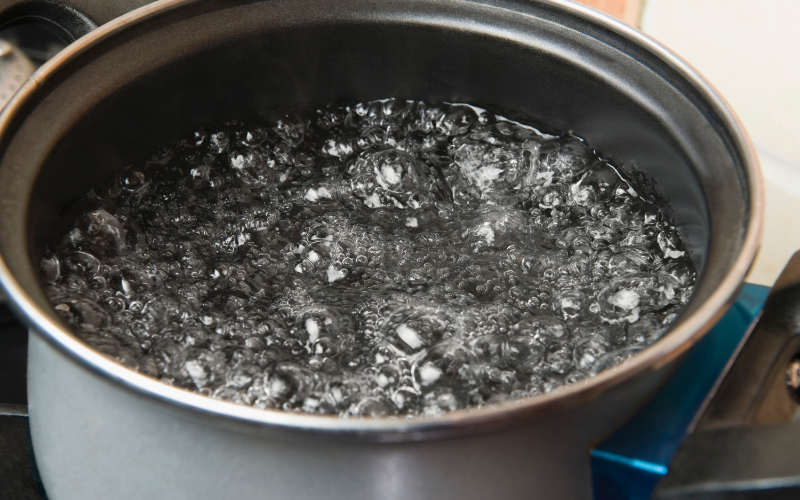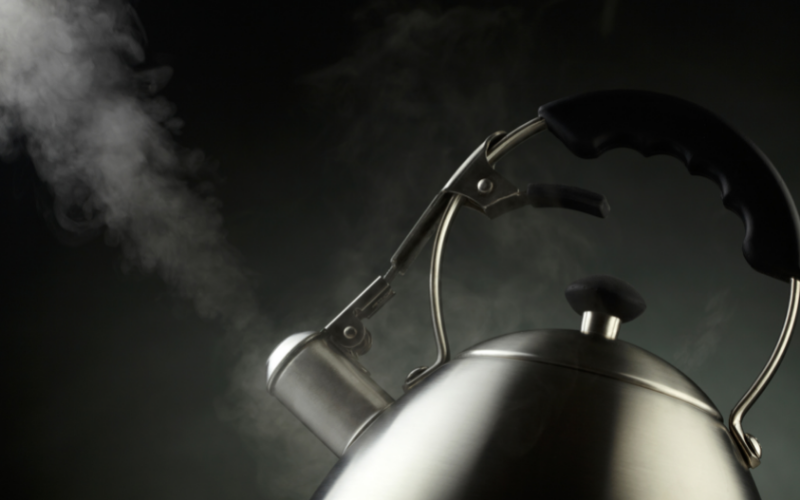Herbicides will kill grass, but many people are worried about the environmental impact herbicides may have. New research shows that glyphosate, a popular herbicide may cause health problems for people, as well. The International Agency for Research on Cancer (IARC) has classified glyphosate as probably causing cancer, although the EPA states it is safe when used according to the label directions. Boiling water is an alternative to herbicides that is very popular. The question, then, is, “Will boiling water kill grass?” Read on for the answer.

Will Boiling Water Kill Grass?
Yes, boiling water will kill your grass. In fact, it kills any plant that it contacts. Of course, you have to be careful when using it or you will get burned by the water, too.
What Is Boiling Water?
Water is made of two hydrogen atoms and one oxygen atom. Unless it is distilled, water also contains trace minerals. Water boils at 212F at sea level. This is hot enough to cause severe burns.
What Does Boiling Water Do To Grass?
Boiling water destroys the leaves and roots of grass by overheating them, causing the plant cells to collapse and sending the plant into shock. For young grass, one application usually kills the grass. For larger plants, you will probably have to retreat it 7-10 days later to completely kill the grass. This treatment is best used on plants growing in cracks in walkways and driveways. The boiling water will kill any other plants it touches, so you need to be careful not to get it on them.
Two common questions when using boiling water are, “Will boiling water kill grassroots?” and “Will boiling water kill grass seeds?” The answer to both is yes. The water kills the root and seeds by overheating them and causing the cells to collapse.
Related Article: What Kills Grass? A Guide to Harmful Substances

How to Use Boiling Water to Kill Your Grass
You will need a large pot and a propane burner. The water will start to cool as soon as you remove it from the burner. This means you will not be able to boil water inside and carry it outside to use in killing grass. It will be too cool to work by the time you get to the grass. Follow the steps below to do this the most effective way.
- Mow or clip the grass short.
- Put a large pot full of water on a burner (propane or electric).
- When it is in a rolling boil, use potholders to carry the water to the grass you want to kill.
- Pour the boiling water on the grass.
If the grass puts out new leaves, treat it again with more boiling water to finish it off.
The water will burn you as well as the plants. Wear closed-toed shoes, long pants, and long sleeves to do this so if the water spatters or spills on you, you will be less likely to be burned by it. A tea kettle is easier to pour than a large pot, but you have to heat it more often than when using a pot because it is smaller.
Does Boiling Water Kill The Soil Microbes?
Yes, boiling water kills everything in the soil, including the microbes and any invertebrates, such as earthworms, it touches. However, soil microbes reproduce so fast that they will soon recolonize the empty spot. It will take longer for the invertebrates to return, but the soil should be full of life again in four weeks or so.
How Do I Treat Boiling Water Spills On Grass?
If you accidentally spill boiling water on your grass, it will most likely kill the leaves. You can quickly flush the area with cool water to lower the temperature of the water as it reaches the roots. Although the plant parts above the ground will die, if the roots are spared they will put out new leaves. This can take as much as two weeks, so be patient. If the grass does die, remove the dead grass. The surrounding grass will grow over the bare area in about four weeks if it is small. Larger bare spots will take longer to cover, but will eventually be full of grass again.
In Conclusion
In conclusion, the answer to our original question, “Will Boiling Water Kill Grass?” is a yes. Boiling water will kill grass, kill grass seeds, and sterilize the soil. To completely kill grass may take a second application, but the grass will die. The heat from the boiling water collapses the cells in the grass, destroying them. While it isn’t practical to kill a whole lawn with boiling water, it works well when removing grass from walkways and driveways.


What natural source can you use to get rid of weeds?
My landlord’s yard has not be taken care of since renting 11 years ago.
I can’t enjoy the yard without having to be covered up head to toe not to get bitten like crazy from whatever’s in the tall grass and flying insects swarming together above the grass. 75% of the grass also has weeds. Wish I can make my deck that is surrounded by tall grass, weeds, biting insects from the grass and air go away. HELP!!!
Hi Eva!
This sounds like an awful situation and one that’s going to take several steps to resolve, though it can be done. Before we get to those steps, however, I’d like to mention that in this situation and with so many weeds I would likely restart this lawn by removing all of the weeds and grass, prepping the soil, and then planting new grass. It doesn’t sound like you have a reasonable landlord but occasionally you can get negotiate some sort of discount if you bring an improvement like this to the property. Beyond this:
I’m not sure how much authority you have over this yard but I can offer you the following menu of solutions that may help you to reduce your insect population.
First, you need to cut down the grass and weeds. This single act is the best and most natural way to drastically reduce the insect population and devastate many of the taller weeds beyond recovery, allowing the grass to take over. If these unwanted plants are too high you may need to use a bladed hand tool of some kind to cut them down. They should then be raked off of the lawn before mowing begins. While I do generally recommend allowing grass clippings to stay on a lawn, any weeds or grass over 6″ high before cutting or mowing may cause damage if they are allowed to cover a lawn all at once.
Once the grass has been cut, you may find that you have no need for any further intervention in order to control the insects, though if you find standing water or perpetually damp lawn below the grass, improving drainage will also reduce the insect population.
If you cannot cut or remove these tall grass and weeds, nothing short of a commercial insecticide will provide the results you’re looking for. Alternatively, you could set up a mosquito net or insect canopy over your deck to keep all of these insects off of you and yours.
I hope this information helps. If you have any further questions, please let me know.
Best, Tom 🙂
I’m really interested in all of the DIY natural gardening tips that i’ve been researching for my own personal use at home. Whether, outside in our flower gardens, indoor for our container garden or indoor for our house plants.
The grass clipping tea is definitely one that I’m wanting to make but, I’m curious if I would be able to more or less boil the actual grass clippings or at the very least pour heated hot water onto the grass clippings, to speed up the process of making the tea?
After reading this article though I’m wondering if that would actually damage the nutrients that I’m trying to extract from the grass clippings to feed my plants?
I’m just feeling somewhat impatient to waiting for the end results of the several day process I keep reading about! Although, if that is the only way to get the nutrients that is needed to use to feed the plants then, I will have to exercise my patience!
I would greatly appreciate any knowledge or advice you could possibly shed on this subject! Thank you so much!
Patiently waiting,
Violet Foehl
Hi Violet,
This is a great question. The short answer is that you can use boiling water to essentially cook the grass and weeds you are using to prepare the fertilizer tea. While some trace nutrients may be lost (most of which are not used by plants in any way), the primary components you want to keep (potassium and nitrogen, among other minerals), are not damaged by cooking or lost if boiled. You do, however, want to make sure the tea is completely cool (room temperature) before being added to your lawn or any other plants.
I hope this helps 🙂 Let us know how you get on!
Tom.